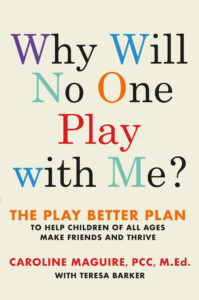Why Will No One Play With Me? by Caroline Maguire (Book Excerpt)
 From WHY WILL NO ONE PLAY WITH ME?: The Play Better Plan to Help Children of All Ages Make Friends and Thrive by Caroline Maguire, PCC, M.ED. Copyright © 2019 by the author and reprinted with permission from Grand Central Publishing. All rights reserved.
From WHY WILL NO ONE PLAY WITH ME?: The Play Better Plan to Help Children of All Ages Make Friends and Thrive by Caroline Maguire, PCC, M.ED. Copyright © 2019 by the author and reprinted with permission from Grand Central Publishing. All rights reserved.
Imagine the brain as a busy harbor, ships coming and going, some docking and others maneuvering their way out to sea, all under constantly changing conditions that can make for smooth sailing or stormy waters. Executive function is the “ship captain” that shapes your child’s view of himself and others in the sea of social activity, organizes the tools your child needs, and trains him in the skills and behaviors he needs to navigate social waters. The captain has a large crew and must coordinate all the activities on this big ship. Each member of the crew has a specific job: stand watch, read the map and chart a course, monitor defense systems, manage communications, maintain the engines, look out for other vessels, and play a role in the full range of day-to-day operations. If the captain is ineffective, then no matter how smart each of the crewmembers is, with a lack of skilled know-how at the helm, the ship can run aground.
It can be tempting to think that the answer to your child’s lagging social skills is to change everything around her: the teacher, the school, the camp, the other kids. Or to give her a pass on behavioral challenges, hoping that she’ll find her niche later as an adult. But unless you recognize what’s really getting in your child’s way—the internal, brain-based source of your child’s difficulties—then these efforts to change the external landscape can have only limited effect.
Over the years, you have watched your child’s social behavior and wondered: Why can’t he just join in and get along with other kids? Through the lens of executive function, you can see the “why.” In the most general way, across all kinds of thought processes involved in learning and behavior, executive function skills affect how your child:
- focuses attention;
- organizes information;
- remembers and learns from past experiences;
- integrates thought processes that shape perception and self-awareness;
- self-regulates to manage physical, cognitive, and emotional stress;
- regulates emotion to maintain equilibrium and avoid extremes;
- adapts to new situations (cognitive flexibility);
- initiates and manages tasks;
- sees the big picture (metacognition);
- visualizes what they can do in a future situation (working memory); n develops an inner voice (self-talk) to guide them (working memory); self-monitors and shows self-awareness; and
- reads conversational and emotional cues from other people, picking up on their thoughts, beliefs, and intentions and using that information to interpret what they say, make sense of their behavior, and anticipate how they’ll react to something. This is sometimes called mind reading.
All of these brain-based capacities and skills directly affect how your child behaves in social situations.
Advances in brain science in the past decade have provided new insights into executive function, its role as the link between the brain and behavior, and its critical relationship to social skills weaknesses. Based on brain scans that show the brain in action as it performs certain tasks, we now know that the executive function command center is part of the prefrontal cortex (PFC). Found in the frontal lobe of the brain, the PFC manages planning, organizing, goal setting, and self-regulation. Executive function is a network of brain circuits devoted to these vital critical-thinking skills and coordinating them to connect smoothly with other systems in the brain and body.
In everyday behaviors, these executive functions show up as:
- what your child pays attention to;
- what he notices about his friends’ needs and reactions;
- his ability to take the bird’s-eye (metacognitive) view of his own behavior and expectations;
- how he responds to disappointment;
- how he manages his emotions;
- how he manages stressful demands, such as sharing or taking turns;
- how he thinks about friendship and reciprocating in a relationship; and n how he adapts or reacts to new or shifting social situations.
Weak executive functions translate into weak social skills. Specifically, they include a child’s inability to:
- recognize that other people have feelings and those feelings may be different from your own;
- predict or anticipate how other people are likely to feel, and read their emotional temperature;
- interpret people’s emotional cues accurately and respond in a socially accepted way;
- recognize the basic content or information that someone is trying to tell you;
- hear not only what someone says, but also how they say it; to accurately interpret tone, intention, and other unspoken cues;
- recognize a listener’s level of interest in a topic;
- anticipate that your actions provoke reactions from other people;
- recognize the unspoken rules and expectations that govern how people behave in a given situation, environment, or occasion; and
- respond appropriately to the other person’s intended message.
Every child is a unique mix of executive function strengths and weaknesses, and every child’s struggles will be different. Executive function isn’t all-or-nothing; there are degrees of impairment, which is why your discerning eye as a parent is such an advantage as a coach. One child may be disorganized but have excellent emotional self-regulation, while another child may be completely organized but lack focus and adaptability. A child may be a precocious athlete, Lego builder, or creative writer, yet be clueless about how to read facial expressions, body language, or basic social cues from other kids. Some children do recognize the need to do so but need specific instruction and practice to learn how. Others are genuinely unaware that this is something they need to do, and that although they aren’t doing it, they can learn how. Stress affects every child’s executive functioning differently, too. A social situation that feels stressful to one child might not faze another, or might not affect them nearly as much.

Caroline Maguire, ACCG, PCC, M.Ed. is a personal coach who works with children with ADHD and the families who support them. Caroline earned her ACCG from the ADD Coach Academy and her PCC from the International Coach Federation (ICF). She also received a Master of Education from Lesley University. Her revolutionary coaching program and methodology helps teach executive function skills to children, teenagers, and young adults. She is a former coach for the Hallowell Center in Sudbury, MA. While with the Hallowell Center, Caroline was the main coach for children and teenagers. Caroline consults with schools and families internationally and has been co-leading social skills groups for over a decade. Visit https://www.grandcentralpublishing.com/titles/caroline-maguire/why-will-no-one-play-with-me/9781538714843/.
Tags: ADHD, caroline maguire, Hallowell Center, special needs children, why will no one play with me















